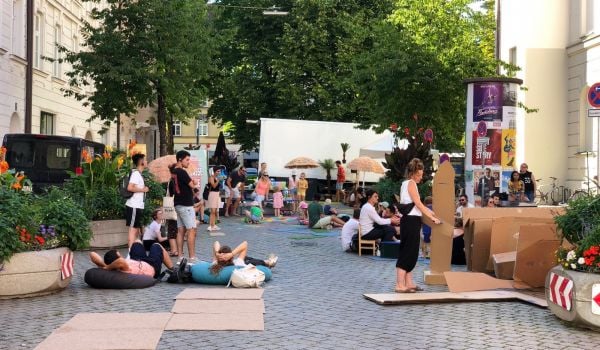“I loved to draw,” says Sam Assefa. Architecture influenced him a lot, especially as a child, growing up in Addis Ababa, the capital of Ethiopia. He used to draw a lot of the old Ethiopian monasteries. “Very monolithic, platonic forms, cubes and models formed out of living rock. I was always fascinated by that,” he explains.
By seventh or eighth grade, he knew he wanted to study architecture. He once got punished for a drawing he did very meticulously, with correct three-dimensional proportions for a very tall building. His art teacher didn’t believe he drew it.
Fortunately, for many under-engaged communities in San Francisco, Chicago and Boulder, Colorado, Assefa did not take the punishment to heart. He still loves architecture, and still makes a life of exceeding expectations. In a few months, he’ll take all of his experience with him to Seattle, where he was recently named the next director of Seattle’s Office of Planning and Community Development.
“I have always admired the city of Seattle for its natural beauty, innovative spirit and strong commitment to social justice,” Assefa said in a statement on the announcement.
Ethiopia has famously never been colonized, despite repeated invasions and partial occupations by foreign powers throughout its history. But amid political strife in the 1970s, Assefa’s father was executed. Assefa fled the country by foot and became a refugee in Kenya. He spent the rest of his high-school years in Nairobi, where he picked up two key influences: an international group of best friends with whom he remains in touch (one each from Austria, Sweden, the U.S. and Chile, and two others from Ethiopia), and a love for Chicago, probably due to its architecture.
“I used to read about Chicago specifically for some reason, while I was in high school,” Assefa says. He would eventually move there (after a short stint in Rome), and study architecture at the University of Illinois. While there, he met his wife, Jill Kongabel, a native Chicagoan.
In his first job in architecture, he noticed a pattern that didn’t fit with his personal ethos. “The first few years of design work I was doing was for very wealthy people. It was a wonderful place, a small design firm,” Assefa says. “But I started thinking about is that what I wanted to do.”
The answer was no. He and his wife left Chicago for Cambridge, Massachusetts, where Assefa went to graduate school for city planning at MIT. He took classes at Harvard’s Kennedy School of Government too. He focused his studies on issues of equity, particularly around public housing. Meanwhile, outside the classroom, he was involved in the divestment movement seeking to end apartheid in South Africa by urging university endowments, foundation endowments and other supposedly socially minded pools of capital to dump South African companies.
After graduate school — after another false start with a private San Francisco architecture firm — Assefa landed at one of the early leaders in socially and environmentally conscious design firms, SMWM (since merged with Perkins+Will), where he joined forces with Karen Alschuler to start the planning practice at the firm. Their first big project: planning around the long-shuttered Hunters Point Shipyard in the largely black neighborhood, which was still reeling from the site’s closure around two decades earlier. The shipyard became one of the first Superfund cleanup sites.
“San Francisco was where I cut my teeth in equity and planning policy,” Assefa says. He would later work in the city of San Francisco’s planning department. He moved to become director of policy for Chicago’s department of planning and development in 2000. In Mayor Richard Daley, Assefa says, he found a willing ally for bringing more equity and diverse voices into the planning process (Assefa served as the city’s liaison for the neighborhood-centric New Communities Program), while simultaneously integrating departments and disciplines whose silos were clearly holding the city back from its potential.
Assefa’s department led Chicago’s first rewriting of its zoning code in 40 years, addressing issues where growth was happening where some communities didn’t want it and not happening where other communities did. He recalls loosening parking requirements for buildings within close proximity to public transportation, and putting in incentives for LEED-certified construction of affordable housing so that residents’ bills could be reduced. While attempting to incentivize and make room for more affordable housing where it was desired, Assefa also recalls protecting manufacturing zones from redevelopment as residential or other use (while others were creating the training infrastructure to make sure new high-skilled manufacturing jobs in Chicago would be accessible to all).
After a stint in Boulder, Colorado, Assefa will now take his silo-busting, social justice-informed approach to the Pacific Northwest.
“In Seattle, as in a lot of cities, a lot of the underrepresented communities or immigrant communities may not be at the table when major planning decisions are being made. Or they are economically affected as a result of the economic shift that is taking place in some of the major cities as well as global shifts,” he notes.
Seattle will be the eighth city where he has lived, spanning four countries on three continents.
“There are differences in context, but fundamentally from a planning perspective, all people are looking for the same general things,” he says. “They want to be safe, they want to love the place where they live, and they want to reap the benefits of what it has to offer.”
Assefa is expected to take his new office on June 1.
The Equity Factor is made possible with the support of the Surdna Foundation.

Oscar is Next City's senior economic justice correspondent. He previously served as Next City’s editor from 2018-2019, and was a Next City Equitable Cities Fellow from 2015-2016. Since 2011, Oscar has covered community development finance, community banking, impact investing, economic development, housing and more for media outlets such as Shelterforce, B Magazine, Impact Alpha and Fast Company.
Follow Oscar .(JavaScript must be enabled to view this email address)












